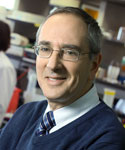 When it comes to cancer and the autoimmune system, everything old is new again, says Antony Rosen, MD, director of the Division of Rheumatology at Johns Hopkins Hospital.
When it comes to cancer and the autoimmune system, everything old is new again, says Antony Rosen, MD, director of the Division of Rheumatology at Johns Hopkins Hospital.
His team’s work, linking cancer and scleroderma, revived the theory that people develop mutation-laden cells with the potential to transform into cancer. It also shows that through immunosurveillance the immune system edits cancer cells, says Dr. Rosen.
He recently discussed the topic in an interview with The Rheumatologist.
Question: What do you want rheumatologists to know about the intersection of cancer and autoimmunity?
Answer: The idea [is] that autoimmunity—and particularly the autoimmune rheumatic diseases—may be initiated in some individuals by changes in antigen structures that are found in cancer. [This] changes the way we think about the origins of autoimmunity … and understanding the way that the disease gets turned on (i.e., that there is a mutation in an antigen, which turns on a immunoresponse [and] acts to kill the cancer, but also acts to damage soft tissue). I think [it] is really a different concept.
Q: The idea that the immune system is editing cells on its own and could stop cancer before it starts is an exciting hypothesis, no?
A: There are great examples—case report kinds of examples, but they still are very tantalizing—that a patient can present with an autoimmune disease like scleroderma. You can find the cancer, remove the cancer, and both the cancer goes away and the scleroderma goes away. Now, that doesn’t happen universally, but there certainly are examples [that] are quite dramatic … Obviously, it’s a tantalizing thought and much more research needs to be put into that.
Q: Where does your research go from here?
A: Understanding complex human diseases is going to come from studying these diseases directly in humans. And the answers are likely going to require a broad multi-disciplinary expertise and the latest revolutionary tools of our day. I think that’s a very important concept. I think these diseases are going to be solved, and they are going to be solved in our professional lifetimes … It’s going to be a reflection of both the great clinical care and descriptions that have happened in the last hundred years, and the application of revolutionary tools of measurement and data analysis that we are currently blessed to have.
Richard Quinn is a freelance writer in New Jersey.


